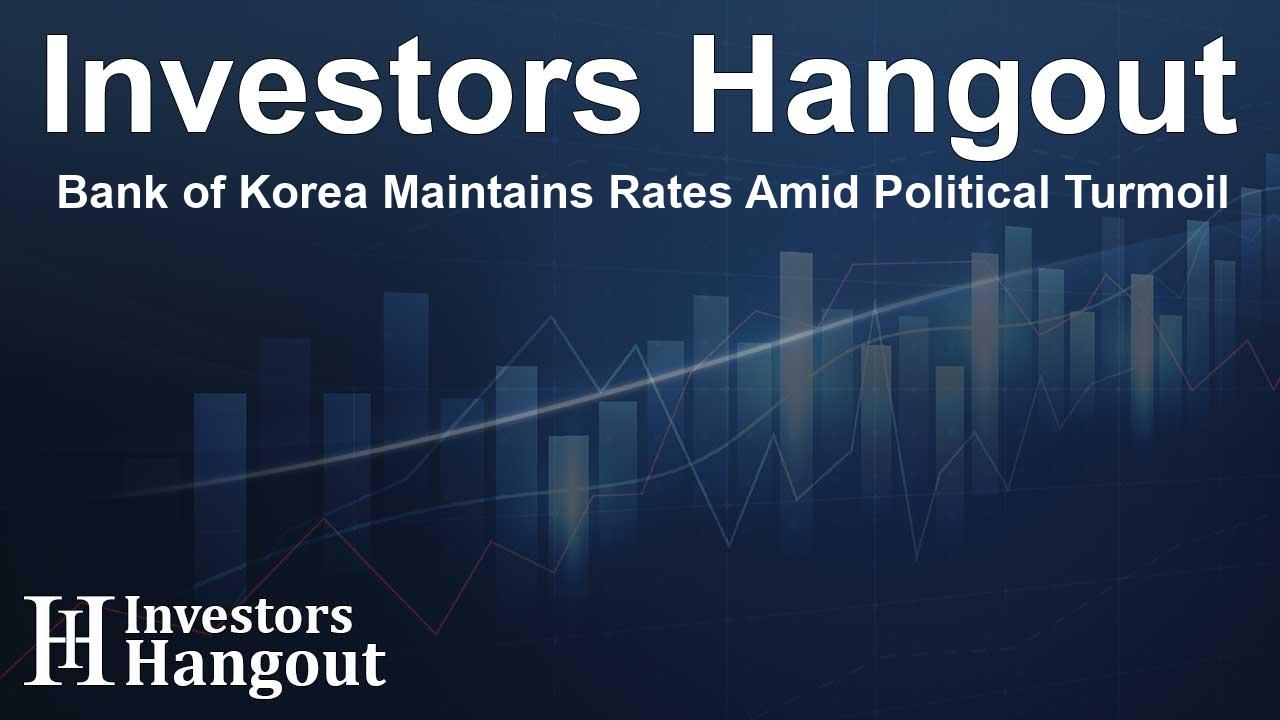Bank of Korea Maintains Rates Amid Political Turmoil

Bank of Korea's Interest Rate Decision
In a surprising move, the Bank of Korea has decided to keep its interest rates unchanged at 3%. This decision comes at a time when political uncertainty is causing ripples in the economy. The recent developments surrounding impeached President Yoon Suk Yeol have added to the complex scenario.
Political Landscape and Economic Implications
The state of politics in South Korea has been tumultuous, particularly with President Yoon’s recent arrest that has left many investors wary. The expectation was that the Bank of Korea would reduce the benchmark rate from 3% to 2.75%, a move that many analysts thought necessary amid declining economic conditions.
Past Rate Cuts
This year, the central bank has already implemented two interest rate cuts as part of its strategy to stimulate economic growth. Analysts initially predicted that further cuts might be on the horizon, particularly as inflation showed signs of weakening.
Market Reactions
Despite the central bank's attempts to bolster the economy, the increasing political unrest has shaken market confidence. The South Korean won has significantly depreciated, reaching its lowest value in 15 years. This situation has led to assumptions that further monetary easing may be required to stabilize the market.
Future Outlook
Looking ahead, economists predict that the Bank of Korea may need to act soon, particularly with continued pressuring factors such as high household debt coupled with sluggish economic growth.
Statements from Analysts
Observers have noted that the central bank has good reasons to anticipate the resumption of its easing cycle in light of the prevailing economic pressures stemming from the ongoing political instability. Capital Economics analysts pointed out that while a resolution to the crisis might come soon, the economic growth may still struggle.
Upcoming Events to Watch
All eyes will be on the impending press conference by BOK Governor Rhee Chang-Yong, which will likely provide further insights into the central bank's policy direction and future monetary strategy.
Frequently Asked Questions
Why did the Bank of Korea keep interest rates unchanged?
The Bank of Korea opted to maintain the interest rate at 3% due to ongoing political uncertainty and its potential impact on the economy.
What are the implications of the political unrest on the economy?
The political unrest is causing market instability, leading to a significant drop in the value of the South Korean won and raising concerns about economic growth.
How many times has the Bank of Korea cut rates in 2024?
The Bank of Korea has cut interest rates twice in 2024 as part of its efforts to support economic growth amid decreasing inflation.
What are economists saying about future cuts?
Economists expect the Bank of Korea to resume rate cuts soon if the political crisis continues, as it is weighing heavily on economic performance.
What should investors be aware of now?
Investors should closely monitor upcoming announcements from the Bank of Korea, particularly the insights shared by Governor Rhee Chang-Yong, which may indicate future monetary policy changes.
About Investors Hangout
Investors Hangout is a leading online stock forum for financial discussion and learning, offering a wide range of free tools and resources. It draws in traders of all levels, who exchange market knowledge, investigate trading tactics, and keep an eye on industry developments in real time. Featuring financial articles, stock message boards, quotes, charts, company profiles, and live news updates. Through cooperative learning and a wealth of informational resources, it helps users from novices creating their first portfolios to experts honing their techniques. Join Investors Hangout today: https://investorshangout.com/
Disclaimer: The content of this article is solely for general informational purposes only; it does not represent legal, financial, or investment advice. Investors Hangout does not offer financial advice; the author is not a licensed financial advisor. Consult a qualified advisor before making any financial or investment decisions based on this article. The author's interpretation of publicly available data presented here; as a result, they should not be taken as advice to purchase, sell, or hold any securities mentioned or any other investments. If any of the material offered here is inaccurate, please contact us for corrections.